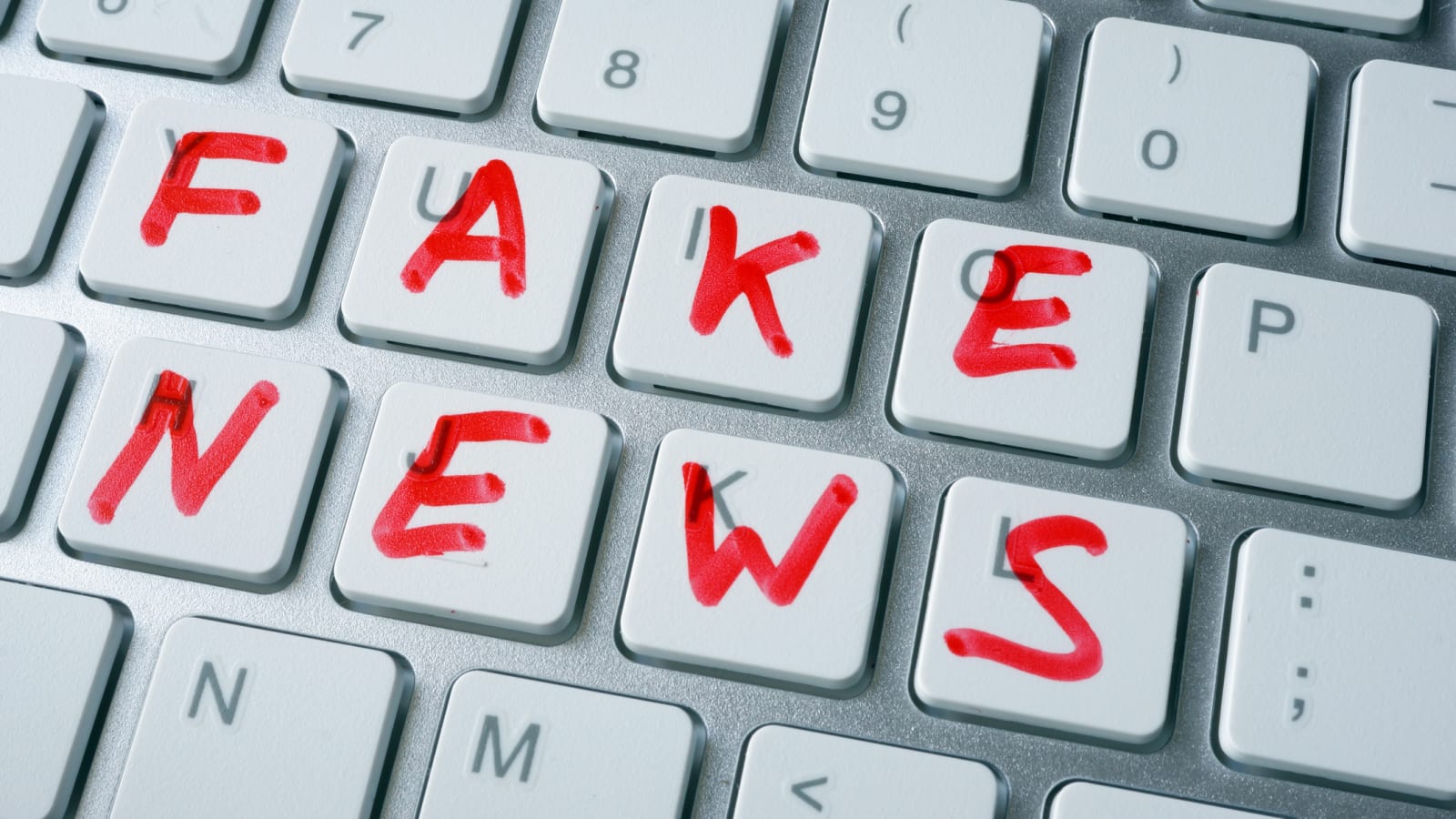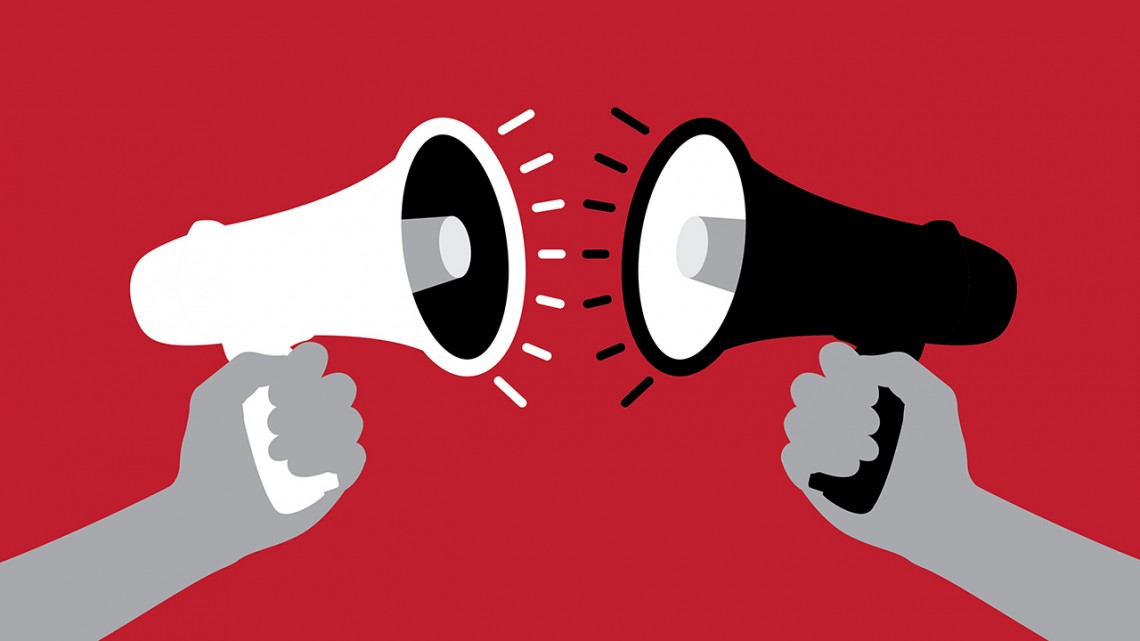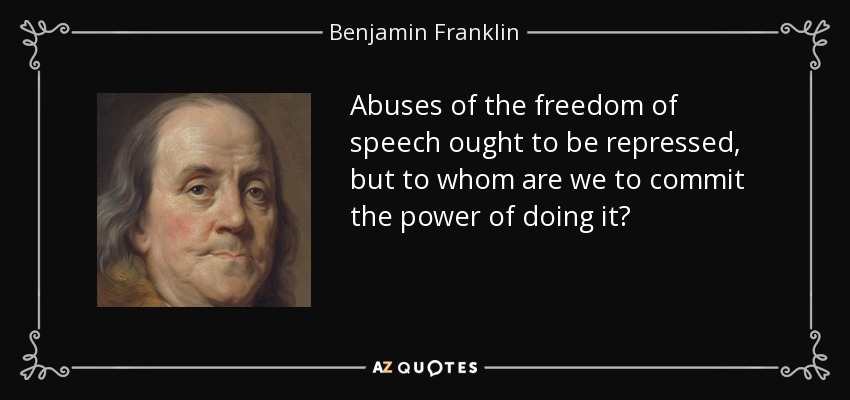Take a glance at this quote and give yourself some time to consider this question. As a matter of fact, we are all aware that freedom of speech should not be misused and exploited, and the majority of us would have the intention and foresight to curtail it. However, who will be the most dependable authority to instigate and manage the endeavor?
When something has benefits, it is inevitable that people will use it for their own gain by any means possible; the same holds true for free speech. When free speech allows politicians to "legally" defame someone and allows individuals to say whatever they want, no one can guarantee that efforts to curtail the abuse will make a difference because everyone involved perceives the abuse as beneficial in some way. Ergo, in addition to self-governance, which may require an elevated degree of discipline, we could potentially empower impartial bystanders, i.e. emotionally intelligent artificial intelligence, as gatekeepers. As such, all interactions and imprints that users leave on the network will be automatically monitored. In this regard, if the emotive tone and intent of the message indicate that the sender is engaging in violent or detrimental conduct or speech, a real-time intervention will prevent the message from being posted publicly. Indeed, it is highly unlikely that AI gatekeepers will withstand on their own; therefore, supplementing AI gatekeepers with human gatekeepers could be beneficial by providing needed context and perspective to situations that AI may not entirely fathom; thereby reducing the likelihood of flawed gatekeeping.
Solution 2: Platform for collaborative fact-checking based on the Echo Chambers Breakers algorithm.
Aside from the method of Blockchain technology described in my previous blog post for thwarting the propagation of false information, we could potentially develop a collaborative fact-checking platform in which everyone has the authority to operate it and share accurate information based on an algorithm that could be dubbed "Echo Chamber Breakers". Due to the platform's decentralized governance structure, it allows anyone, from individuals to large institutions to contribute to its upkeep by providing independently verifiable fact checks and data. Subsequently, if a user is discovered to be disseminating misinformation, other users may downvote his postings, thereby reducing his visibility, whereas upvotes will increase his visibility. Other than that, this fact-checking platform's adopted algorithm could serve as a point of differentiation.
In conventional social media platforms, the algorithm analyses what sorts of content users are most likely to ingest, and once affirmed, all the information provided is predicated on the same type of content, resulting in what is known as an Echo Chamber. On the contrary, this fact-checking platform will be utilizing Echo Chambers Breakers algorithm that has the opposite effect, providing users with previously unseen content and perspectives. Thereby, this will reduce the risk that a supporter of a particular conspiracy theory will continue to consume the same content, thereby bolstering his belief in the veracity of the theory as he thought that everyone was on the same page.
Solution 3: Real-name authentication requirements on online platforms.
Moreover, mandating internet users to authenticate with their actual names could be a viable remedy to the exploitation of freedom of expression. Nevertheless, revealing the identities of authorized users to the public who are subsequently implicated in abuse cases to the public could further exacerbate the problem of cyberbullying and hate speech.
Thus, the true identity will remain confidential from other users and will only be divulged to authorities if someone attempts to abuse free speech for malicious purposes. In this way, the government could keep tabs on any violent actions perpetrated by an individual and teach them that their words entail consequences without exposing them to the perils of cyberbullying and hate speech. Likewise, when users intend to report the abusive conduct of others, the reporting mechanisms will remain anonymous.
I'm bringing this up because I believe we've all heard of the concept of freedom of expression, but I'm certain that a lot of people don't comprehend its essence and how it should be practiced. Given that cyberbullying is so prevalent in the digital world today, isn't it an offspring of excessively advocated free speech? Therefore, we should all consider whether freedom of speech is positive or negative and how it could be utilized for the benefit of the global community.
Buang, S. (2019). Freedom of
speech: do not cross the line. New Straits Time. https://www.nst.com.my/opinion/columnists/2019/01/446413/freedom-speech-do-not-cross-line
Carrilo, E. R. (2022). The
fine line between fake news and freedom of speech. King’s College London. https://www.kcl.ac.uk/the-fine-line-between-fake-news-and-freedom-of-speech
ConnectUS.17 freedom of
speech pros and cons. https://connectusfund.org/17-freedom-of-speech-pros-and-cons
Council of Europe. (2016). Hate
speech is not free speech, says secretary general ahead of human rights day.
https://www.coe.int/en/web/portal/-/hate-speech-is-not-free-speech-says-secretary-general-ahead-of-human-rights-day
Deichler, K. (2022). When
the freedom of speech becomes an excuse for abuse. Lighthouse Global
Community. https://www.lighthousecommunity.global/post/when-the-freedom-of-speech-becomes-an-excuse-for-abuse
Gikunda, A. (2021). Pros
and cons of freedom of speech. Pros and Cons. https://prosancons.com/government/pros-and-cons-of-freedom-of-speech/
Hopkins, B. (2021). Freedom
of speech pros and cons: what both sides think. The Flag. https://theflag.org/glossary/freedom-of-speech-pros-and-cons-what-both-sides-think/
IvyPanda. (2021). Censoring
free speech: pros and cons research paper. https://ivypanda.com/essays/censoring-free-speech-pros-and-cons/
Mac-Iyalla, D. (2020). The
misuse of freedom of speech – a nation’s tragedy. Interfaith
Diversity Network of West Africa. https://itdnowa.org/2020/07/19/the-misuse-of-freedom-of-speech-a-nations-tragedy/
Matravers, D. (2018). Should
there be limits to freedom of speech? Professor of philosophy, derek matravers,
explores this idea. OpenLearn. https://www.open.edu/openlearn/history-the-arts/philosophy/freedom-speech-1
Nwaodike, C. (2020). False
information and free speech. Atlas Corps. https://atlascorps.org/false-information-and-free-speech/
Reynolds, S. (2022). Cyberbullying
linked with suicidal thoughts and attempts in young adolescents. National Institutes of
Health. https://www.nih.gov/news-events/nih-research-matters/cyberbullying-linked-suicidal-thoughts-attempts-young-adolescents
The Business Anecdote.
(2022). Is free speech truly free?: the impact of free speech on social
media users. https://www.thebusinessanecdote.com/post/is-free-speech-truly-free-the-impact-of-free-speech-on-social-media-users
UKEssays.com. (2017). The
abuse of freedom of speech. https://www.ukessays.com/essays/general-studies/abuse-freedom-speech-8253.php
United Nations. (2019). Hate
speech versus freedom of speech. https://www.un.org/en/hate-speech/understanding-hate-speech/hate-speech-versus-freedom-of-speech
Vojinocic, I. (2023). Heart-breaking
cyberbullying statistics for 2023. DataProt. https://dataprot.net/statistics/cyberbullying-statistics/








Comments
Post a Comment